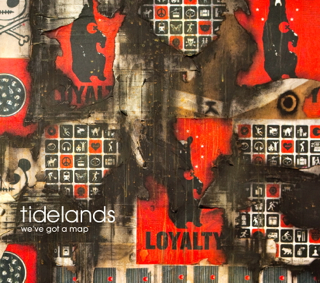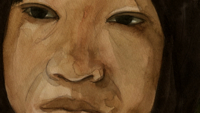Adrian Rodriguez - SF Weekly
San Francisco's Tidelands is a pop-rock combo whose music could easily fit in a shuffle of David Bowie, Wilco, and R.E.M. The duo blends twinkling guitars, ornamental synths, and strings -- with a booming flugelhorn -- into a melange it calls "orchestral indie." Gabriel Montana Leis' vocal delivery recalls Talking Heads frontman David Byrne, with unique phrasing that transitions from tongue-twisting quips to sustained legatos. Tidelands plays Amnesia May 17 with Sister Grizzly and The Cushion Theory at 6:30 p.m. ($7 - $10). When Tidelands takes the stage expect Leis and Mie Araki to reproduce the same grandiose orchestration heard on standout songs like "The New Black" and "Holy Grail" with live loops and samples. The duo sat with SF Weekly to talk about "orchestral indie," choreographing a live performance, and how being a duo allows for a bigger sound. Stream Tidelands' album, We've Got A Map while you read.
You both have interesting backgrounds. How did each of you end up in the U.S.?
Leis: I was actually born in India. My mom just liked to move around a lot. We lived in Michigan, Montana, Southern California, but my dad was in Marin County. Because My dad was stable in Marin, that was my base. After that I spent a year traveling and then I went to college in Colorado, and then came back and lived in Marin for a couple of years. I've been in the city for a solid 15, 16 years playing music.
Araki: I was born and grew up in Japan until I was 20 years old. I went to New York to study music at the Conservatory of Music. I studied classical at first, and then I fell in love with the drums. I changed my major from classical to jazz and started playing a drum set. Then I moved to the Bay Area. I went to San Jose State for my masters and studied different worlds of music, African drums and Chinese music.
Does the fact that you both traveled so much influence your music, and the "orchestral indie" label?
Leis: I think some of my lyrical sense has that worldly vibe to it. Mie's been here for a long time, but she's Japanese, so I think that her influence is definitely there in the sound, but it's definitely a combination of my history and her background.
Araki: I studied music in Japan for one year. I decided to quit because I said I'm not going to make it in Japan, so I went to New York. Being a female percussionist just sounded really cool so that's what made me want to study music. Classical orchestra is my first influence and my drumming comes from my Jazz background.
Tidelands' records include many layers: There are the basic instruments, the vocals, guitars and drums, but you add the orchestral instruments on top of that. As a duo, how do you recreate the records in a live performance?
Leis: If we can't do exactly what's on the record, we've rearranged the songs to be interesting with whatever tools we have at our disposal. It's a challenge that I think we've tackled head-on. I know looping can look impressive to an audience member. There is a lot of orchestration involved, but forget the looping -- just watch Mie. She's playing huge fat drum beats, dropping amazing synth bass lines, playing melodies and chords -- and singing. Really, it's pretty darn impressive.
Araki: It's not that natural. Music comes to my mind, and I hear it first. I hear the layers and the finished product in my head and I choreograph the song like a dance. At a show I'm not thinking too hard what to do, because my body remembers. With my layers and Gabriel's layers, it's going to sound like a four or five piece band.
It sounds like quite a challenge. Why does Tidelands stay as a duo? Why not recruit a full band?
Araki: Since we're a two-piece there are so many options to go with that's different from the traditional band form. I wanted to be away from that traditional band style.
Leis: After years of rehearsals and trying to arrange five people to get together with everyone's schedules, it's really nice to go to the studio [with just two members]. I enjoy being there. We're both very self-motivated. Mie was the last drummer in a succession of drummers in my old band, Love X Nowhere. We were all still sharing a studio for awhile, and she and I were the only ones that kept showing up. We never sat down and said, let's start a band. We certainly never said, "lets do a two-piece." We found ourselves a studio for a fair amount, wrote a couple of songs, and it just went from there.
When did you decide then that this was Tidelands, and that you would be just a two-piece?
Leis: I picked up the flugelhorn shortly after we had started playing together. Around the same time is when she got the synth and started adding bass lines to the music. I think when those two instruments were added, maybe four or five months into when we first started playing together, that was the moment when we were like, "oh there is a sound here." I do a lot of live looping, too. It became a sound that was unique to itself rather than just because we didn't have other musicians to play with.
Tidelands' sound is polished, and you've packaged your band very professionally. What is your plan for the future?
Araki: I love to share our music with as many people as possible. We hope people get interested in our stuff. That's the pure dream I have.
Leis: I have a lot of responsibility. I'm turning 40. Staying healthy, having a job, and being in a relationship, there's lots of things that pull you in different directions and it is a challenge to do music. I've been up for that challenge for 20-plus years. Whether that means not getting enough sleep or setting your alarm earlier, you find a way. It's a tough gig, and there isn't a lot of monetary success out there to be had. So I savor the moments that that I've gotten to do exciting things, even the private moments in my studio when I've created something that sounds and feels incredible. All of those rehearsal hours that build up to short 35-minute sets when you're on a three-band bill, those are the moments to savor.





